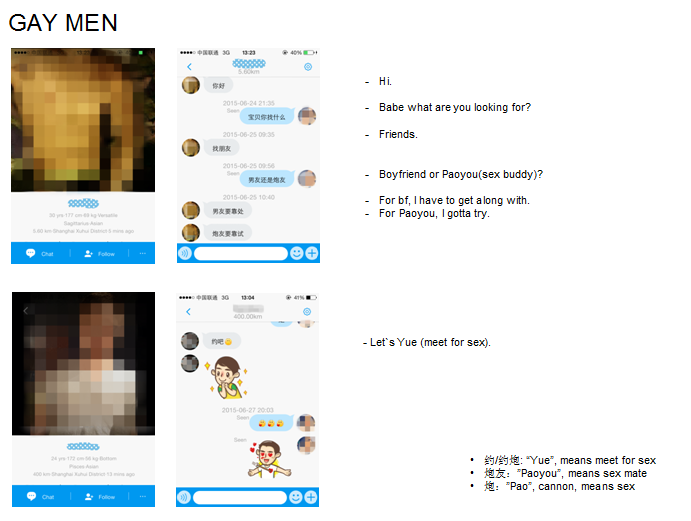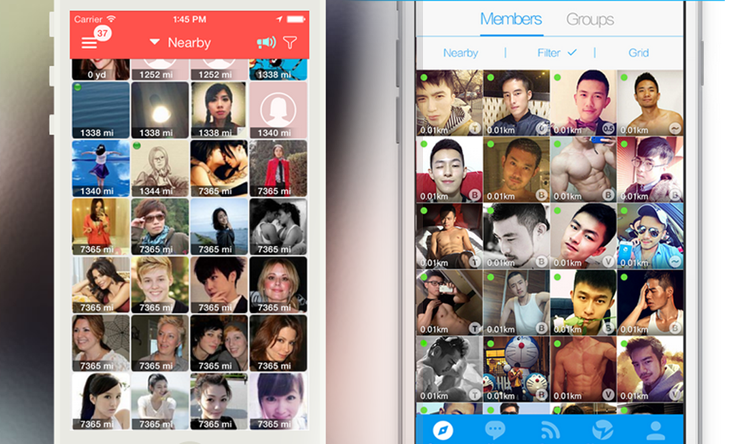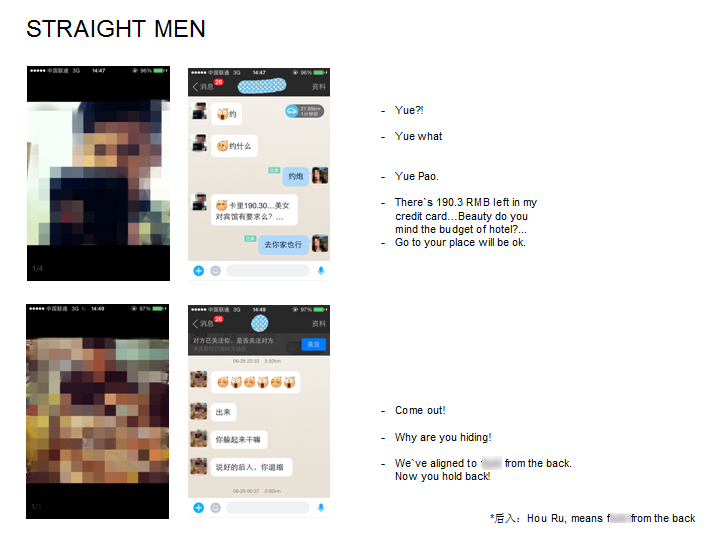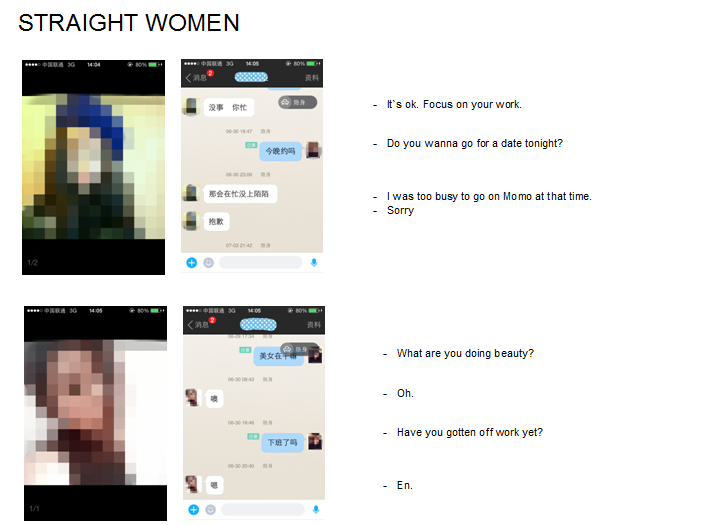
 |
|
|||||||
| Coffee Shop Talk of a non sexual Nature Visit Sam's Alfresco Heaven. Singapore's best Alfresco Coffee Experience! If you're up to your ears with all this Sex Talk and would like to take a break from it all to discuss other interesting aspects of life in Singapore, pop over and join in the fun. |
 |
|
|
Thread Tools |
|
#1
|
|||
|
|||
|
An honorable member of the Coffee Shop Has Just Posted the Following:
Momo love to give: uncensored insight into behaviour, desires of Chinese using dating apps Creative agency executive Kevin Choi, in extracurricular research, reveals some trends on the way men and women in China, whether gay or straight, find love or sex through apps PUBLISHED : Sunday, 05 July, 2015, 8:38pm UPDATED : Sunday, 05 July, 2015, 8:52pm Jing Zhang [email protected] Twitter: @jingerzhanger  A mobile screen showing the page of Momo, a very popular mobile location-based social network. Photo: Simon Song Dating apps are now a normal part of modern courtship, with popular Western programmes like Tinder, Grindr, Happn and Scruff revolutionising the way people meet. A similar movement is occurring in mainland China, especially among the young and urbanised, but little is known about how this has changed the way they find love and sex. Momo or Tantan might sound like items on a trendy cocktail list, but Momo is in fact China’s largest online dating app with an estimated 180 million users and has already had an IPO in the US. Then there is publicly listed Jiayuan coming in close with 150 million users, followed by newcomer Tantan, which has a Tinder-style “swiping” interface that allows users to swipe their fingers to peruse through thousands of profiles of potential partners. Kevin Choi, head of strategy and digital at French creative agency Air Paris’ Shanghai office, decided to get a closer look, launching a research project outside of work to find out more. He had a team of researchers who helped him in his extracurricular research. “We created fake profiles” of a gay man, straight man, straight woman and gay woman – all generically attractive, he explains. “But [we] tried to standardise responses and chat initiations across the board where possible.”  The most obvious finding seemed to be that the likelihood of finding sex online in China was vastly easier as a gay man, than as a gay woman or straight person. This slide shows sample responses from gay men in Kevin Choi's study. Choi and his team spent two intensive weeks chatting to (but never meeting) more than 400 users on China’s biggest dating apps. “Momo is the clear dominant app in China for straight people. And for gay men, there’s Jack’d [with five million users] and Blued [with 15 million users], while The L and LesPark are both apps for lesbian women,” says Choi. “The user experience is similar across the apps: you message someone if you like their profile and wait for their response.” Choi presented the results in a talk titled “Looking Online for Love and Sex in China” yesterday at Shanghai’s Datong Mill to an audience that was a mix of local and international. The findings, given colour by chat screen grabs, were an uncensored insight into how Chinese app users express their desires, interact and present themselves online. While Choi’s team didn’t “follow through” any of these chats, they gauged what people wanted. Their findings? The most obvious seemed to be that the likelihood of finding sex online in China was vastly easier as a gay man, than as a gay woman or straight person. Many straight women were unresponsive to flirting, chatting or even invitations just for a coffee, such that Choi concluded that for straight men, even the handsome ones seemed to lose out easily online.  Social media apps Lespark and (left) and Blued. Photos: Lespark.us, Blued.cn One clue might be Momo’s user base, which is 84 per cent male and which Choi’s research found to be overeager. In response to the fake straight-female avatar bringing up the idea of a “hook-up” but then declining to follow through, the men continued to badger for responses. Some even rushed into a hotel room without a solid commitment from the female avatar, awaiting their mystery woman for a “419” – Chinese slang for one-night stand. “There was a big difference in how different groups represented themselves,” says Choi. “Lesbian profiles tended to have more visual and clear self-representation with full-face selfies expected and used as well as more ‘artistic’ and ‘reflective’ pictures. “Gay guys had the most complex range: those pictures just showing flesh and muscles tend to be looking exclusively for sex, whereas face shots and still life tended to be those who didn’t want to give clues about whether their intentions were romantic or purely sexual.” They found that a lot of straight women tend to use selfies, and highly stylised and Photoshopped pictures. Despite so much effort poured into their profile pictures, Choi said this group was the least responsive and most wary. Cold, dismissive one-character responses – of the “Hmm” and “Ah, OK” type – were incredibly common for this group and it was very difficult to elicit a promise of a meeting with them.  Momo’s user base is 84 per cent male and, according to Choi’s research, mostly overeager. This slide shows sample responses from straight men in Kevin Choi's study. “Straight men’s presentation of themselves were all over the place,” Choi adds. “When there’s photos of their faces, there was little consideration to how flattering the picture was or general aesthetics such as bad lighting … They came across as kind of desperate when a woman showed interest, often urgently messaging despite being ignored.” Data from Analysis International last year found that, in China, the top four ways that Chinese couples met were through family and friends (still the top method), followed by (in descending order) online dating sites, work and study, as well as WeChat, Momo, and messaging service QQ. A 2012 study on American dating, led by Stanford University associated professor of sociology Michael J Rosenfeld and published in the American Sociological Review, provides a quantitative background comparison. For straight American couples, meeting through online dating has grown sharply from virtually zero prior to the 1990s (when few public had access to regular personal internet) to more than 20 per cent of couples in 2010. For gay couples, the shift was more extreme, with the number growing from virtually zero per cent in the early ‘90s to almost 70 per cent in 2010. All other forms of meeting were noticeably in decline. Those still dreaming about meeting over furtive, romantic glances at the local coffee shop or restaurant might be discouraged to hear that the Chinese now spend about eight hours a day on their smartphones, one of the top global rates. Fifty-five per cent of these hours are supposedly spent on apps. This is perhaps reflective of a global trend.  Cold, dismissive one-character responses were incredibly common for straight women and it was very difficult to elicit a promise of a meeting with them. This slide shows sample responses from straight women in Kevin Choi's study. While more young Chinese are turning to dating apps for love, sex, fun or just out of curiosity, it isn’t complete easy sailing for these companies. Momo and Jiayuan might have raised legitimacy and massive funds through IPOs, but increased government concern about how dating apps can be a catalyst for lewd content and online prostitution has set off serious action. This made headlines last February when authorities launched a crackdown and a whole host of apps were shut down for “spreading obscene content and allowing registration with false names”. There were 120 apps shut down for this reason to date. The apps used in Choi’s project have so far escaped this fate. Choi is thinking of extending the project in the future, to develop broader data and refine his methodology in a bid to learn more about the nuances of online dating in the country. “As young people in China continue to rely on their smartphones to improve their lives, these dating apps will evolve even with government regulations,” says Choi, “because the search for love and sex is fundamental to human existence. It cannot be denied.” Click here to view the whole thread at www.sammyboy.com. |
| Advert Space Available |
 |
| Bookmarks |
|
|